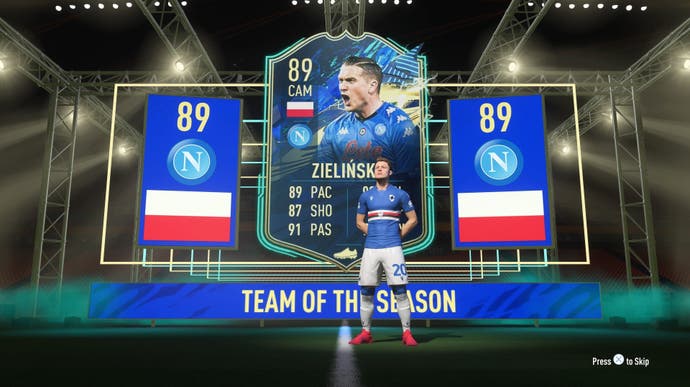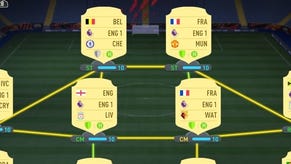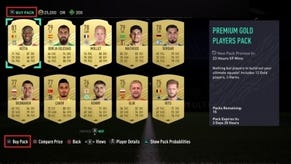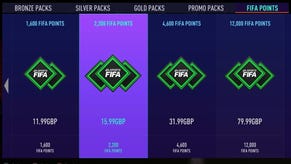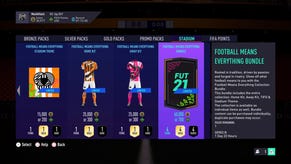EA denies it's "pushing" FIFA players to spend on loot boxes after insider leaks marketing documents
Park the bus.
EA has denied it's "pushing" FIFA players to spend money on loot boxes after a "gaming insider" leaked marketing documents to a mainstream publication.
CBC's Go Public published two pages from an internal FIFA 21 document that discusses the company's approach to Ultimate Team, the controversial mode whose loot boxes have been labelled gambling.
"FUT is the cornerstone and we are doing everything we can to drive players there," a bullet point close to the top of the document says.
Another leaked page from the document contains the line "all roads lead to FUT", and reveals EA's plan to "funnel" players towards FUT from other modes.
Go Public reports that the insider leaked the document because "he and others he knows who work on video games don't feel good about projects that include loot boxes".
"We can't really do anything about it because at the end of the day, [the] company is trying to make money and satisfy investors," the insider is quoted as saying.
Another internal EA document allegedly refers to FUT Coins, the in-game currency you earn through playing, as "grind currency".
The insider takes issue with FIFA 21 steering customers towards FUT when they've already forked out full-price for the game and may be happily enjoying non-FUT modes.
"For years... they've been able to act with a layer of plausible deniability," the insider is quoted as saying.
"Yet in their internal documents, they're saying, 'This is our goal. We want people driven to the card pack mode.' "
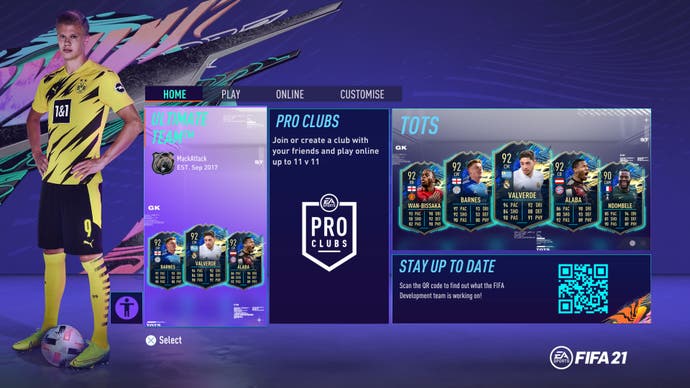
EA has hit out at Go Public, accusing its report of being a "sensationalised story with a misrepresentation of the facts".
In a lengthy statement issued to Eurogamer, EA said: "We always look for opportunities to introduce more players to modes in our games. Our FIFA players are expecting fresh content that makes the service exciting, so that's a constant focus for us."
EA insisted "we do not 'push' people to spend in our games".
"Where we provide that choice, we are very careful not to promote spending over earning in the game, and the majority of FIFA players never spend money on in-game items."
One line in the internal document says "players will be actively messaged and incentivised to convert throughout the summer".
EA defended this language, saying the summer is a very active time within the FUT community, "and we ensure more of our new content and community events in the game are centered there."
"The new content that we introduce throughout the year includes extensive non-monetised rewards," EA continued. "Decisions to spend are always entirely optional."
Then: "Nothing in the leaked document contradicts this in any way - it shows how we are supporting engagement in our game during the summer period, not spending."
EA goes on to stress its position:
"We take very seriously our responsibility to provide players a safe and fun experience.
"We don't encourage young players to spend in our games, and we strongly recommend use of family controls to manage the content that children are allowed to access, their ability to spend in games, and how much time they can play. Our EA platform for PC games also includes dedicated Child and Teen accounts, so that all of our players and their parents can make informed choices about how they play. And tools like FIFA Playtime help players take control of how they play, including the ability to set limits to manage their engagement and purchasing."
Then, onto the claim that FIFA's loot boxes are gambling, which EA once again denied. "We also firmly disagree that FIFA or any of our games involve gambling," EA said.
"Regulators in multiple countries around the world have stated publicly that where there is no cashout method, loot boxes do not constitute gambling.
"We take great care to ensure that our games are played as designed, including by taking action against those who violate our rules against trading outside the game. We do not believe there is merit in any of the recent litigation filed in the US or Canada and are confident the courts will agree.
"Recently, a US Federal Court judge dismissed a related case noting that 'the lack of any real-world transferable value to items takes them outside' of the gambling laws. So again, supported by all of these perspectives from authorities, we do not believe any aspect of EA's games constitutes gambling."
And finally: "We hope to see these facts more accurately represented in the future. In the meantime, we continue to work every day to ensure our FIFA Ultimate Team players have the best possible experience playing the game they love."
It's worth running through EA's statement here to see if it holds up under scrutiny. I don't think anyone who plays FIFA will be surprised to hear that EA puts a focus on Ultimate Team. It's the company's money-spinner, after all, bringing in hundreds of millions of dollars each year for EA. FIFA players have for some time now accused EA of neglecting non-FUT modes in the game (just look at the recent situations around Pro Clubs and Career Mode, for example).
Onto the next line: "We do not 'push' people to spend in our games. Where we provide that choice, we are very careful not to promote spending over earning in the game, and the majority of FIFA players never spend money on in-game items."

While it may be true the majority of FIFA players never spend on in-game items, many would take issue with the suggestion FUT does not "push" people to spend. Ultimate Team has long been called "pay-to-win" - even by its own professional players.
In a recent Eurogamer feature, FIFA pro Zelonius told us he'd spent around £5000 in the last three years on Ultimate Team in a bid to compete in the competitive multiplayer portion of the mode.
EA has also been accused of making highly-desirable Icon cards, such as the Moments versions of the Icon cards for legendary players Maldini, Gullit, Viera, Cruyff, Ronaldo, Zidane and Eusebio, virtually unobtainable because of crushingly low pack odds, which in-turn fuels black market spending.
Then there's EA's use of the fear of missing out (FOMO) via limited-time card releases, which have been accused of encouraging players to spend money in short, sharp bursts as they bid to obtain cards they think will never be available again.
"Decisions to spend are always entirely optional," EA claims. That's not entirely true. Certain cards are only available via card packs, either because of the way they are released, or because of their scarcity on the in-game auction house.

"We don't encourage young players to spend in our games," EA claims. In September, EA pulled a controversial FIFA microtransactions advert that encouraged children to spend real world money on Ultimate Team loot boxes.
In a statement to Eurogamer issued at the time, EA said it had undertaken an immediate review of all future media placements, and admitted the FIFA Points advert shouldn't have appeared in the toy magazine in the first place.
"We also firmly disagree that FIFA or any of our games involve gambling," EA said. "Regulators in multiple countries around the world have stated publicly that where there is no cashout method, loot boxes do not constitute gambling. We take great care to ensure that our games are played as designed, including by taking action against those who violate our rules against trading outside the game."
As Eurogamer has reported, when it comes to Ultimate Team, you can very much cash out. A cursory glance online reveals the black market for the buying and selling of FUT Coins is alive and kicking - despite EA's best effort.
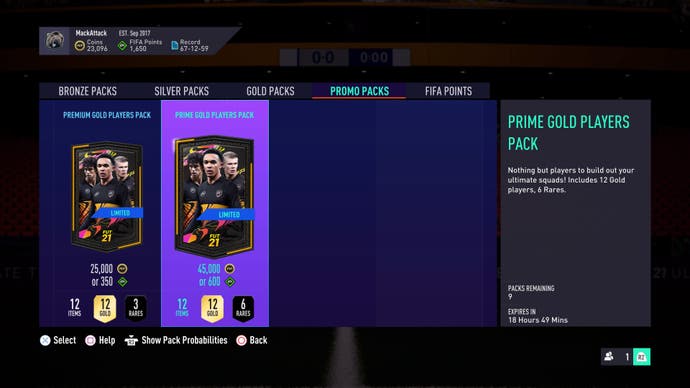
And while many countries do not currently consider loot boxes to be a form of gambling, some countries do, and other countries, including the UK, are investigating the possibility.
Earlier in April, new research "robustly verified" a link between loot boxes and problem gambling.
Researchers at the universities of Plymouth and Wolverhampton said loot boxes "are structurally and psychologically akin to gambling". It also found that large numbers of children are opening loot boxes.
The new research, commissioned by the GambleAware charity, found that of the 93 per cent of children who play video games, up to 40 per cent opened loot boxes. It also found 12 out of 13 studies on loot boxes established "unambiguous" connections to problem gambling behaviour, with young men the most likely to use loot boxes, and young age and lower education correlating with increased use.
The report said many games use a "psychological nudge" to encourage people to buy loot boxes - such as the fear of missing out on limited-time items or special deals.
This can be seen clearly in FIFA Ultimate Team, which regularly trades on FOMO by releasing powerful, coveted cards in limited quantities or for limited periods of time.
I think the leak of EA's internal marketing document here is a red herring. It is no surprise to see the FUT push from a FIFA 21 document like this. I suspect marketing documents from rival publishers use similar language to describe pushing players to the parts of their games that generate recurring spending.
It is worth analysing EA's response, though, not only to see if it holds up, but also to give us an idea of the company's stance on the continued attack on its golden goose. It seems to me that the pressure on loot boxes is intensifying, and while EA is willing to let revenue go from markets such as Belgium, it will cling on to the money it makes from the likes of the UK, which is, historically, obsessed with Ultimate Team, until the last second.
